|
|
|
Sort Order |
|
|
|
Items / Page
|
|
|
|
|
|
|
| Srl | Item |
| 1 |
ID:
143403
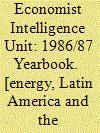

|
|
|
|
|
| Publication |
London, Economist Publication Ltd, 1987.
|
| Description |
158p.pbk
|
|
|
|
|
|
|
|
|
|
|
|
Copies: C:1/I:0,R:0,Q:0
Circulation
| Accession# | Call# | Current Location | Status | Policy | Location |
| 029209 | 505.550/EIU 029209 | Main | On Shelf | General | |
|
|
|
|
| 2 |
ID:
128624


|
|
|
| 3 |
ID:
145572


|
|
|
|
|
| Publication |
Gurgaon, Penguin Books India Pvt Ltd, 2012.
|
| Description |
xxvi, 180p.pbk
|
| Series |
Story of Indian Business
|
| Standard Number |
9780143426189
|
|
|
|
|
|
|
|
|
|
|
|
Copies: C:1/I:0,R:0,Q:0
Circulation
| Accession# | Call# | Current Location | Status | Policy | Location |
| 058696 | 330.91054/TRA 058696 | Main | On Shelf | General | |
|
|
|
|
| 4 |
ID:
108311
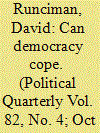

|
|
|
|
|
| Publication |
2011.
|
| Summary/Abstract |
The success story of democracy over the twentieth century has given way to doubts in the twenty-first, as democracies struggle to cope with difficult wars, mounting debts, climate change and the rise of China. This essay uses intellectual history to explain the link between long-term democratic success and short-term democratic failure. It distinguishes three distinct views of what can go wrong with democracy, and identifies the third (which I call 'the confidence trap', an idea that originates with Tocqueville) as the key to understanding our present predicament. Democratic success creates blind spots and a reluctance to tackle long-term problems. I use this idea to explain and put in context Fukuyama's claims about the end of history, and to examine the link between democratic failure and market failure.
|
|
|
|
|
|
|
|
|
|
|
|
|
|
|
|
| 5 |
ID:
126995
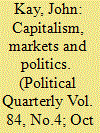

|
|
|
|
|
| Publication |
2013.
|
| Summary/Abstract |
The term 'capitalism' is no longer a relevant way in which to describe or to understand a modern economy. Ownership of capital is not the source of economic power that it once was. Business leaders of today do not own the factories and the machines, nor do they need to. Let us consider instead, markets. Not the markets for financial products that we see depicted on rows of flickering screens in Canary Wharf, but real markets. Market economies have proved to be chaotic, and imperfect and yet they are the most successful way we know to allocate goods and services. Through a process of experimentation, much failure and some success they evolve. Their development is necessarily uncertain, but that is also their greatest strength.
|
|
|
|
|
|
|
|
|
|
|
|
|
|
|
|
| 6 |
ID:
102409
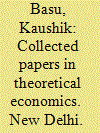

|
|
|
|
|
| Publication |
New Delhi, Oxford University Press, 2005.
|
| Description |
4 V; p.
|
| Contents |
Vol. 1: Development, markets, and institutions
Vol. 2: Rationality, games, and strategic behaviour
Vol. 3: Welfare, law, and globalization
Vol. 4: Inter-disciplinary transgressions : political economy, moral philosophy, and economic sociology
|
| Standard Number |
9780195667615, hbk
|
|
|
|
|
|
|
|
|
|
|
|
Copies: C:4/I:0,R:4,Q:0
Circulation
| Accession# | Call# | Current Location | Status | Policy | Location |
| 055873 | 330.015193/BAS 055873 | Main | On Shelf | Reference books | |
| 055874 | 330.015193/BAS 055874 | Main | On Shelf | Reference books | |
| 055875 | 330.015193/BAS 055875 | Main | On Shelf | Reference books | |
| 055876 | 330.015193/BAS 055876 | Main | On Shelf | Reference books | |
|
|
|
|
| 7 |
ID:
181901


|
|
|
|
|
| Summary/Abstract |
Can traditional cultural practices thrive if they are commercialised? Or should the state protect them from “the market”? This study investigates these questions by studying the marketisation of traditional handicrafts in the tourism sector of Nanjing municipality (Jiangsu Province, China). Building on Boltanski and Esquerre’s (2020) work on the “enrichment economy,” I find that state-led marketisation efforts have simultaneously raised and distorted the value of intangible cultural heritage (ICH) commodities in China. Many ICH inheritors are stuck in the middle: although they benefit from enhanced recognition and valorisation of ICH products, they face difficulties in competing with “fake” and luxury ICH commodities. ICH commodities are thus characterised by an “in-between” status – between the enriched and the mass economy.
|
|
|
|
|
|
|
|
|
|
|
|
|
|
|
|
| 8 |
ID:
120816


|
|
|
|
|
| Publication |
2013.
|
| Summary/Abstract |
Beginning in 2004, the Chinese central government introduced the concept of boards of directors to wholly state-owned enterprise groups (guoyou duzi qiye jituan, ). Increasingly, creating external boards (waibu dongshi, ) has also been emphasized to realize effective corporate governance. This latest state effort exemplifies how the Chinese party-state is searching for feasible-but not necessarily the best-ways to accommodate market-oriented institutions with local political-economic realities, thus creating its own regime of corporate governance. To this end, this study examines the rise of external boards, standing committees, and the rules of two-way interventions (shuangxiang jinlu, ).
|
|
|
|
|
|
|
|
|
|
|
|
|
|
|
|
| 9 |
ID:
144265
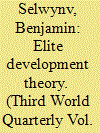

|
|
|
|
|
| Summary/Abstract |
Much development theory is based upon elite-led conceptions of social change. Elite development theory (EDT) conceptualises ‘the poor’ as human inputs into or, at best, junior partners within elite-led development processes. This elitism contributes to the continual (re)framing of the poor as passive beneficiaries of elite policy, and legitimates economic exploitation of the poor. These claims are illustrated by discussing a number of EDT traditions – the Washington/Post-Washington Consensus, statist political economy, modernisation Marxism and varieties of pro-poor growth. As an alternative to EDT the article argues for a conception and practice of ‘labour-centred development’.
|
|
|
|
|
|
|
|
|
|
|
|
|
|
|
|
| 10 |
ID:
073636
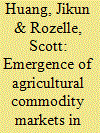

|
|
|
|
|
| Publication |
2006.
|
| Summary/Abstract |
By conscious design, reformers in China only gradually focused their efforts on expanding the role of markets for the allocation of goods and services in the economy. As a result, markets-especially in the agricultural sector-developed slowly. Throughout the 1990s there was a heated debate about the degree to which markets had emerged. The main goal in this paper is to bring together a number of simple and revealing facts on the emergence of China's markets. To do so we examine several sets of price data and analyze spatial patterns of market prices contours over time and text the extent to which market prices are integrated among China's regions. According to our analysis, we find that to a remarkable degree, agricultural commodity markets have emerged; price patterns look much like those in market economies in the rest of the world and prices are highly integrated across space.
|
|
|
|
|
|
|
|
|
|
|
|
|
|
|
|
| 11 |
ID:
091355
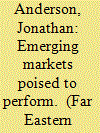

|
|
|
| 12 |
ID:
108764
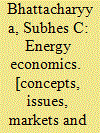

|
|
|
|
|
| Publication |
Verlag, Springer, 2011.
|
| Description |
xxvi, 721p.
|
| Standard Number |
9780857292674, hbk
|
|
|
|
|
|
|
|
|
|
|
|
Copies: C:1/I:0,R:0,Q:0
Circulation
| Accession# | Call# | Current Location | Status | Policy | Location |
| 056395 | 333.7/BHA 056395 | Main | On Shelf | General | |
|
|
|
|
| 13 |
ID:
105805
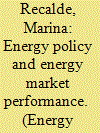

|
|
|
|
|
| Publication |
2011.
|
| Summary/Abstract |
n the early 1990s Argentina liberalized and privatized the energy system, trending to a total market oriented system and abandoning the use of energy policy. Since 2004, as a result of a boom in energy demand and constrains in energy supply, Argentina has gone through an energy problem mainly related to natural gas and electricity, which derived in energy shutdowns. In this frame, this study explores the role of energy policy and institutions in Argentina, with the aim of discussing whether it has been properly used to contrast the observed lack of coordination between fossil energy reserves management and the demand of fuels in power generation. The results of the analysis enhance the relevance of regulatory and control authorities, as well as the active use of long run energy policy for the energy system performance in order to avoid coordination failures between subsectors of the system. The relevance of energy consumption for the development process, and the particular characteristics of energy systems require a wide planning perspective.
|
|
|
|
|
|
|
|
|
|
|
|
|
|
|
|
| 14 |
ID:
108461
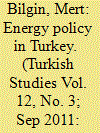

|
|
|
|
|
| Publication |
2011.
|
| Summary/Abstract |
This paper focuses on the shift in Turkey's energy policy and analyzes the development of energy mix, investments plans and pipelines. The paper indicates how energy security, which was originally conceived as an input of development, became a strategic tool for Turkey's regional and foreign relations. It elaborates Turkey's actual energy strategy, which has recently been introduced by the state authorities. The article addresses investment opportunities and restraints with a particular focus on pipeline politics. It ends by identifying Turkey's assumptions about the future. The conclusion points out the consistencies and contradictions between Turkey's energy security and its aspiration to benefit from pipeline politics.
|
|
|
|
|
|
|
|
|
|
|
|
|
|
|
|
| 15 |
ID:
105898


|
|
|
|
|
| Publication |
2011.
|
| Summary/Abstract |
The European Union (EU) is the largest importer and exporter of services and plays a dominant role in the global services economy. Although such key economic indicators suggest the EU's services market is open to both EU and non-EU service providers alike, a number of administrative, legal and regulatory barriers remain in place-potentially restricting cross-border trade in services, in particular in the professional services sector. In order to overcome these potential trade barriers, the EU has adopted a number of legislative measures to improve the operation of its internal services market. The EU Services Directive and the Directive on the Recognition of Professional Qualifications aim to make the EU a more open and efficient marketplace for EU service providers, notably for professional services providers. The EU's long-lasting process in providing market access and the recognition of professional qualifications for EU professionals underscores the difficulties of creating a well-integrated economy by progressively reducing the member states' competences and prerogatives. This process also emphasises the challenges faced by non-EU service providers attempting to provide professional services across EU member states. This article critically examines the effectiveness of the EU as a market for professional services for both EU and non-EU professionals, and argues that there is still much work to be done in the implementation of these directives before the EU achieves its aim as a leader in the global market for professional services.
|
|
|
|
|
|
|
|
|
|
|
|
|
|
|
|
| 16 |
ID:
105897


|
|
|
|
|
| Publication |
2011.
|
| Summary/Abstract |
The paper explores the European Union's historical, current and possible future approaches to the use of regulatory competition (be it unconditional or subject to some core common rules before leading to mutual recognition) and regulatory harmonisation in the trade in goods in the Single Market. Section 1 describes the 'long march' of the European Commission from the 'Old' Approach to the 'New' Approach to the 'New Legislative Framework', a march far from over. It shows that the Old and New Approaches are much less different-and increasingly so-than generally said. Both are a mix of harmonisation and 'mutual recognition'-the principle according to which goods lawfully produced in one country cannot be banned from sale on the territory of the other country, even if they are produced with different technical or quality specifications. Finally, section 1 describes the shrinking use of mutual recognition by the EC during the last twenty years. Section 2 examines the EC technical regulations policy in the world context with its two very different tracks, the Mutual Recognition Agreements with its large trading partners and the Deep and Comprehensive Free Trade Agreements with its Eastern and Southern neighbours. The concluding section underlines the increasing gap between the current EC policy and what is desirable from the European consumers' welfare perspective. The EC is increasingly missing the opportunities offered by the mutual recognition principle-an irony since it was the European Court of Justice which created this notion, and a worrisome evolution since it reflects an increasing mistrust among EC Member States (hereafter, ECMS). Finally, the concluding section presents five proposals for reinvigorating the use of the mutual recognition in EC law.
|
|
|
|
|
|
|
|
|
|
|
|
|
|
|
|
| 17 |
ID:
123628
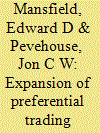

|
|
|
|
|
| Publication |
2013.
|
| Summary/Abstract |
The growing number of preferential trading arrangements (PTAs) since World War II has generated substantial interest in their economic and political effects. It has also prompted interest in the factors that give rise to PTAs, but very little research has been conducted on the growth of extant PTAs. To address this shortcoming, we analyze why some arrangements expand, whereas others do not. We find strong evidence that expansion is most likely when the existing members of a PTA display a high degree of trade openness and when the size distribution of these members is fairly uniform. We also find that PTAs that add new members are likely to do so again in the near future and that, throughout the global system, PTAs tend to expand in clusters. Equally, there is some indication that the market size of a PTA affects its odds of expansion. Finally, we investigate which states join enlarging PTAs. We find that PTAs expand by taking on new members that are economically and politically similar to existing members.
|
|
|
|
|
|
|
|
|
|
|
|
|
|
|
|
| 18 |
ID:
095446


|
|
|
|
|
| Publication |
London, Allen Lane, 2010.
|
| Description |
xxx, 361p.
|
| Standard Number |
9781846143212, Pbk
|
|
|
|
|
|
|
|
|
|
|
|
Copies: C:1/I:0,R:0,Q:0
Circulation
| Accession# | Call# | Current Location | Status | Policy | Location |
| 054941 | 330.973/STI 054941 | Main | On Shelf | General | |
|
|
|
|
| 19 |
ID:
001335


|
|
|
|
|
| Publication |
Cheltenham, Edward Elgar, 1998.
|
| Description |
xx, 748p.
|
| Standard Number |
185968467X
|
|
|
|
|
|
|
|
|
|
|
|
Copies: C:1/I:0,R:0,Q:0
Circulation
| Accession# | Call# | Current Location | Status | Policy | Location |
| 040857 | 337/LEV 040857 | Main | On Shelf | General | |
|
|
|
|
| 20 |
ID:
109067


|
|
|
|
|
|
|
|